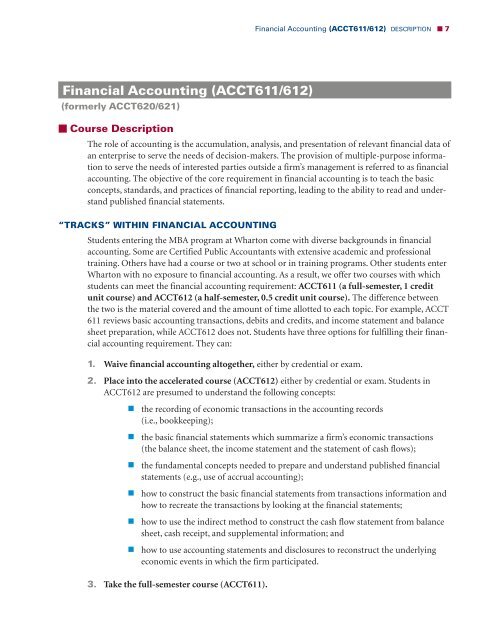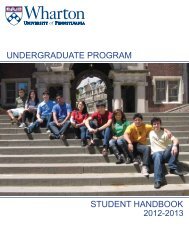Waiver Information Guide - Wharton's SPIKE - University of ...
Waiver Information Guide - Wharton's SPIKE - University of ...
Waiver Information Guide - Wharton's SPIKE - University of ...
You also want an ePaper? Increase the reach of your titles
YUMPU automatically turns print PDFs into web optimized ePapers that Google loves.
Financial Accounting (ACCT611/612)<br />
(formerly ACCT620/621)<br />
Course Description<br />
Financial Accounting (ACCT611/612) DESCRIPTION 7<br />
The role <strong>of</strong> accounting is the accumulation, analysis, and presentation <strong>of</strong> relevant financial data <strong>of</strong><br />
an enterprise to serve the needs <strong>of</strong> decision-makers. The provision <strong>of</strong> multiple-purpose information<br />
to serve the needs <strong>of</strong> interested parties outside a firm’s management is referred to as financial<br />
accounting. The objective <strong>of</strong> the core requirement in financial accounting is to teach the basic<br />
concepts, standards, and practices <strong>of</strong> financial reporting, leading to the ability to read and understand<br />
published financial statements.<br />
“TRACKS” WITHIN FINANCIAL ACCOUNTING<br />
Students entering the MBA program at Wharton come with diverse backgrounds in financial<br />
accounting. Some are Certified Public Accountants with extensive academic and pr<strong>of</strong>essional<br />
training. Others have had a course or two at school or in training programs. Other students enter<br />
Wharton with no exposure to financial accounting. As a result, we <strong>of</strong>fer two courses with which<br />
students can meet the financial accounting requirement: ACCT611 (a full-semester, 1 credit<br />
unit course) and ACCT612 (a half-semester, 0.5 credit unit course). The difference between<br />
the two is the material covered and the amount <strong>of</strong> time allotted to each topic. For example, ACCT<br />
611 reviews basic accounting transactions, debits and credits, and income statement and balance<br />
sheet preparation, while ACCT612 does not. Students have three options for fulfilling their financial<br />
accounting requirement. They can:<br />
1. Waive financial accounting altogether, either by credential or exam.<br />
2. Place into the accelerated course (ACCT612) either by credential or exam. Students in<br />
ACCT612 are presumed to understand the following concepts:<br />
the recording <strong>of</strong> economic transactions in the accounting records<br />
(i.e., bookkeeping);<br />
the basic financial statements which summarize a firm’s economic transactions<br />
(the balance sheet, the income statement and the statement <strong>of</strong> cash flows);<br />
the fundamental concepts needed to prepare and understand published financial<br />
statements (e.g., use <strong>of</strong> accrual accounting);<br />
how to construct the basic financial statements from transactions information and<br />
how to recreate the transactions by looking at the financial statements;<br />
how to use the indirect method to construct the cash flow statement from balance<br />
sheet, cash receipt, and supplemental information; and<br />
how to use accounting statements and disclosures to reconstruct the underlying<br />
economic events in which the firm participated.<br />
3. Take the full-semester course (ACCT611).




